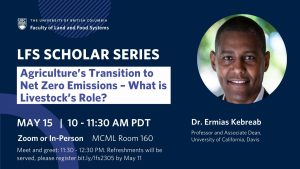Land and Food System Scholar Series
Invited scholar: Dr. Ermias Kebreab
Hosted by: Marina von Keyserlingk, Applied Animal Biology
Title: Agriculture’s Transition to Net Zero Emissions – What is Livestock’s Role?
Abstract: Agriculture is a key source for greenhouse gases (GHG) emissions. It is responsible for more than half of (human-driven) sources of methane, a GHG responsible for 30% of global temperature rise since the industrial revolution, as well as almost three-quarters of the sources of the nitrous oxide released annually. The Paris Agreement set a goal of reducing global agricultural methane emissions by between 24% and 47% by 2050 to limit warming to 1.5°C. Analysis of mitigation options show that the greatest reductions that can be achieved from agriculture are related to livestock, particularly ruminants. There are several mitigation strategies developed or under development to reduce enteric methane emissions. These can range from direct intervention in the adult through the use of inhibitors or even vaccines, to several indirect methods, modulation of rumen microbiome and breeding towards low methane-emitting animals. An analysis conducted to assess how the world can reduce global methane by at least 30% by 2030 (Global Methane Pledge) showed that it is possible to do so in animal agriculture, however, attaining net zero emissions from the sector will largely depend on reducing nitrous oxide emissions.
Biography: Ermias Kebreab is Associate Dean and Professor of Animal Science in the College of Agriculture and Environmental Sciences and the Director of the World Food Centre at the University of California-Davis. He also holds the Sesnon Endowed Chair in Sustainable Agriculture. He conducts research in animal nutrition, mathematical modeling of biological systems and impact of livestock on the environment. He is contributing author to 2019 IPCC update on enteric methane emissions. He co-chaired the feed additive and methane committees of the Food and Agriculture Organization of the UN. He has authored over 250 peer-reviewed articles and received several awards including Excellence in Ruminant Nutrition and International Agriculture from American Society of Animal Science, and 2022 Chancellor’s Innovator of the year award. He served on two committees of The National Academies of Sciences, Engineering and Medicine on methane and nutrition of dairy cattle. He is a regular invited speaker including a TED talk that has been featured as one of the ‘must-watch climate talks of 2022’ by ted.com. His research was in the top 10 of all research conducted at the University of California system in 2021. He holds a B.S. degree from the University of Asmara, Eritrea and an M.S. and Ph.D. from the University of Reading, U.K.
Join in person or via Zoom:
Date: May 15, 2023
Time: 10:00-11:30 AM PDT
Location: In-person at MCML 160, or via Zoom
Meet and greet after the presentation: 11:30 – 12:30 PM, please register here by May 11.

 Follow
Follow